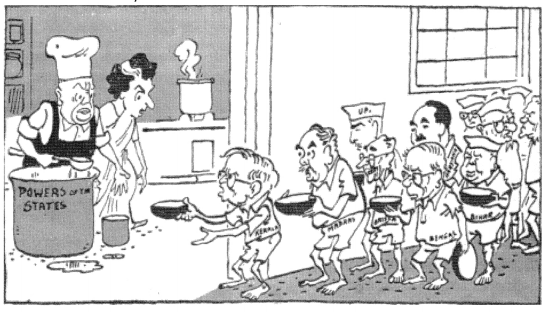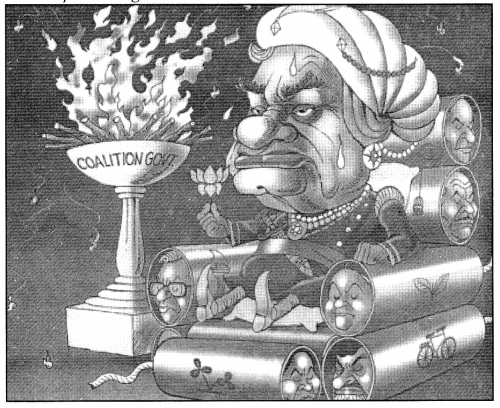Check the below NCERT MCQ Questions for Class 10 Civics Chapter 2 Federalism with Answers Pdf free download. MCQ Questions for Class 10 Social Science with Answers were prepared based on the latest exam pattern. We have Provided Federalism Class 10 Civics MCQs Questions with Answers to help students understand the concept very well. https://mcqquestions.guru/mcq-questions-for-class-10-civics-chapter-2/
Federalism Class 10 MCQs Questions with Answers
Choose the correct option:
Federalism Class 10 MCQ Question 1.
The number of seats reserved for women in the panchayats and municipalities is
(a) one-fourth
(b) one-third
(c) half
(d) one-fifth
Answer
Answer: (b) one-third
Class 10 Federalism MCQ Question 2.
‘Holding together federations are not found in
(a) India
(b) Spain
(c) Belgium
(d) Australia
Answer
Answer: (d) Australia
Federalism MCQ Class 10 Question 3.
Subjects like computer software comes in the
(a) Union List
(b) State List
(c) Concurrent List
(d) Residuary List
Answer
Answer: (d) Residuary List
MCQ Of Federalism Class 10 Question 4.
Which of the following states has been given a special status?
(a) Jammu and Kashmir
(b) Tripura
(c) Bihar
(d) Haryana
Answer
Answer: (a) Jammu and Kashmir
Class 10 Civics Chapter 2 MCQ With Answers Question 5.
The number of Scheduled Languages in India is
(a) 21
(b) 22
(c) 23
(d) 25
Answer
Answer: (b) 22
Class 10 Civics Chapter 2 MCQ Question 6.
Which one of the following States in India has its own Constitution?
(a) Uttarakhand
(b) Madhya Pradesh
(c) J & K
(d) Nagaland
Answer
Answer: (c) J & K
MCQ On Federalism Class 10 Question 7.
Which among the following are examples of ‘Coming together federations’?
(a) India, Spain and Belgium
(b) India, USA and Spain
(c) USA, Switzerland and Australia
(d) Belgium and Sri Lanka
Answer
Answer: (c) USA, Switzerland and Australia
Ch 2 Civics Class 10 MCQ Question 8.
In India’s federal system, the state governments have the power to legislate on all those subjects which are included in the:
(a) Union list
(b) State list
(c) Concurrent list
(d) Residuary subjects
Answer
Answer: (b) State list
Federalism Class 10 MCQ With Answers Question 9.
The Constitution of India
(a) divided powers between centre and states in three lists.
(b) divided powers between centre and states in two lists.
(c) listed the powers of the states and left the undefined powers to the state.
(d) Specified the pow ers of the states and left the residuary powers with the centre.
Answer
Answer: (a) divided powers between centre and states in three lists.
MCQ Federalism Class 10 Question 10.
In case of a clash between the laws made by the centre and a state on a subject in the concurrent list:
(a) the state law prevails.
(b) the central law prevails.
(c) both the laws prevail within their respective jurisdictions.
(d) the Supreme Court has to intervene to decide.
Answer
Answer: (b) the central law prevails.
Civics Chapter 2 Class 10 MCQ Question 11.
What is the third tier of government known as?
(a) Village Panchayats
(b) State government
(c) Local self-government
(d) Zila Parishad
Answer
Answer: (c) Local self-government
Explanation:
The third tier of government known as the local self-government. Local government is the best way to realise one important principle of democracy, namely local self-government.
Class 10 Civics Ch 2 MCQ Question 12.
What is true regarding sources of revenue in a federal system?
(a) States have no financial powers or independent sources of revenue.
(b) States are dependent on revenue or funds on the central government.
(c) Sources of revenue for each level of government are clearly specified to ensure its financial autonomy.
(d) States have no financial autonomy.
Answer
Answer: (c) Sources of revenue for each level of government are clearly specified to ensure its financial autonomy.
Explanation:
Sources of revenue for each level of government are clearly specified to ensure its financial autonomy.
MCQs Of Federalism Class 10 Question 13.
Which of the following is incorrect regarding a unitary government?
(a) There is either only one level of government or the sub-units are subordinate to the central government.
(b) The central government can pass on orders to the provincial government.
(c) A state government is conservable to central government.
(d) The powers of state governments are guaranteed by the Constitution.
Answer
Answer: (d) The powers of state governments are guaranteed by the Constitution.
Explanation:
Under the unitary system, either there is only one level of government or the sub-units are subordinate to the central government. The central government can pass on orders to the provincial or the local government and state government is conservable to central government.
Civics Class 10 Chapter 2 MCQ Question 14.
What are the kinds of routes through which federations have been formed?
(a) One route involves independent states coming together on their own to form a bigger unit
(b) The second route is where a large country decides to divide its powers between the states and the national government
(c) Both a and b
(d) None of these
Answer
Answer: (c) Both a and b
Explanation:
There are two kinds of routes through which federations have been formed. The first route involves independent States coming together on their own to form a bigger unit, so that by pooling sovereignty and retaining identity they can increase their security.
Civics Ch 2 Class 10 MCQ Question 15.
Which period saw the rise of regional political parties in many states of the country?
(a) Period after 1990
(b) Period after 2000
(c) Period after 1980
(d) Period after 1970
Answer
Answer: (a) Period after 1990
Explanation:
All this changed significantly after 1990. This period saw the rise of regional political parties in many States of the country. This was also the beginning of the era of coalition government at the Centre.
Question 16.
Which language is recognised as the national language by the Constitution of India?
(a) Hindi
(b) English
(c) Tamil
(d) None of these
Answer
Answer: (d) None of these
Explanation:
Our Constitution did not give the status of national language to any one language. Hindi was identified as the official language. But Hindi is the mother tongue of only about 40 per cent of Indians.
Question 17.
Which state of India enjoys a special status and has its own Constitution?
(a) Bihar
(b) Uttar Pradesh
(c) Kerala
(d) Jammu and Kashmir
Answer
Answer: (d) Jammu and Kashmir
Explanation:
Jammu and Kashmir has its own Constitution. Many provisions of the Indian Constitution are not applicable to this State. Indians who are not permanent residents of this State cannot buy land or house here.
Question 18.
Which of the following subjects is not included in the Union list?
(a) Defence
(b) Foreign affairs
(c) Police
(d) Banking
Answer
Answer: (c) Police
Explanation:
Union List includes subjects of national importance such as defence of the country, foreign affairs, banking, communications and currency.
Question 19.
Which of the following is not an example of ‘holding together’ federations?
(a) India
(b) Spain
(c) Belgium
(d) Switzerland
Answer
Answer: (d) Switzerland
Explanation:
A large country decides to divide its power between the constituent States and the national government. India, Spain and Belgium are examples of this kind of ‘holding together’ federations.
Question 20.
Which level of government in India has the power to legislate on the ‘residuary’ subjects?
(a) Union government
(b) State government
(c) Local self-government
(d) Both a and b
Answer
Answer: (a) Union government
Explanation:
According to our constitution, the Union Government has the power to legislate on these ‘residuary’ subjects.
Picture-based Questions:
Look at the following cartoons taken from NCERT Textbook page 21 and answer the question that follow:
The States Plead for More Powers

Perils of Running a Coalition Government

Question:
The above two cartoons show the relationship between Centre and States. Should the State go to the Centre with a begging bowl? How can the leader of a coalition keep the partners of government satisfied?
Answer
Answer:
The State should not go to the Centre in such a manner. Ours is a federal country and the principle of federalism works on the power sharing arrangement. The two levels of government i.e., the Centre and State governments have their own jurisdiction in specific matters of legislation, taxation and administration. Hence, the centre cannot order the State government to do something, nor can it stop them from ensuring their rights as autonomous federal units.
The leader of the coalition should accommodate different groups and factions in his/her party as well as among alliance partners. He/she should heed to the views and positions of the coalition partners and do accordingly.
We hope the given NCERT MCQ Questions for Class 10 Civics Chapter 2 Federalism with Answers Pdf free download will help you. If you have any queries regarding Federalism CBSE Class 10 Civics MCQs Multiple Choice Questions with Answers, drop a comment below and we will get back to you soon.